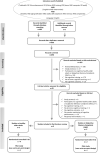Cognitive Tele-Enhancement in Healthy Older Adults and Subjects With Subjective Memory Complaints: A Review
- PMID: 34290660
- PMCID: PMC8287022
- DOI: 10.3389/fneur.2021.650553
Cognitive Tele-Enhancement in Healthy Older Adults and Subjects With Subjective Memory Complaints: A Review
Abstract
Background: In recent years, emphasis has been placed on cognitive enhancement to stimulate cognitive abilities and prevent functional decline. Considering that traditional face-to-face interventions can be very expensive and are not accessible to all individuals, the need to transfer care from the clinic to the patient's home is evident. In this regard, cognitive tele-enhancement interventions have received increased attention. Aim: The aim of this review was to provide an overview of protocols that apply remotely controlled cognitive training with individualized feedback on performance by the therapist in healthy older adults or participants with subjective memory complaints. Methods: Out of 35 articles assessed for eligibility, eight studies were identified. Of the selected studies, five included cognitively healthy older adults, while three included participants with subjective memory complaints. Results: Most of the reviewed studies showed beneficial effects of cognitive tele-enhancement interventions, reporting improvements in memory, sustained attention, working memory, executive functions, and language abilities. Moreover, reductions in anxiety and depression symptomatology levels, as well as in subjective memory difficulties, were described in some of the studies. Conclusions: Cognitive tele-enhancement treatment could be a good alternative to face-to-face intervention. This literature review highlights the importance of applying preventive cognitive interventions to subjects with initial subjective memory complaints. Remote modalities seem to facilitate the application of such interventions.
Keywords: cognitive; healthy older adults; subjective memory complaints; tele-enhancement; telerehabilitation.
Copyright © 2021 Alaimo, Campana, Stoppelli, Gobbi, Baglio, Rossetto, Binetti, Zanetti, Manenti and Cotelli.
Conflict of interest statement
The authors declare that the research was conducted in the absence of any commercial or financial relationships that could be construed as a potential conflict of interest.
Figures
References
-
- US Census Bureau. Older People Projected to Outnumber Children for First Time in US History. National Population Projections; (2018).
-
- World Health Organization . Demographic Trends, Statistics and Data on Ageing (2020).
Publication types
LinkOut - more resources
Full Text Sources


